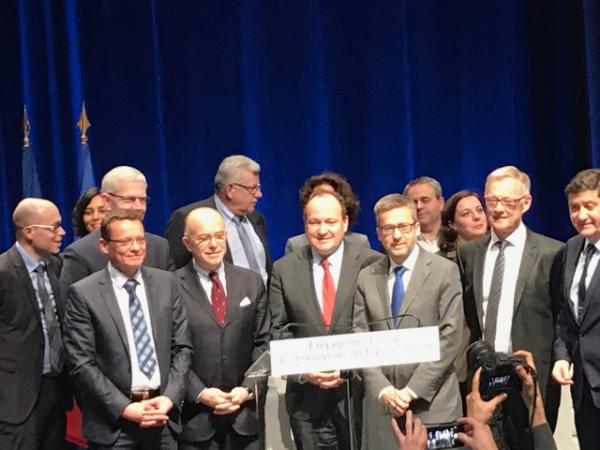
On 7 March 2017, European Investment Bank (EIB – the EU bank) Vice-President Ambroise Fayolle and Syndicat Mixte des Transports (SMT) Artois-Gohelle President Laurent Duporge signed a EUR 110m finance contract to implement the Bulles innovative and sustainable transport project. The signing ceremony took place in Oignies in the Hauts-de-France region, and was attended by French Prime Minister Bernard Cazeneuve and European Commissioner for Research, Science and Innovation Carlos Moedas.
This financing is supported by the European Fund for Strategic Investments (EFSI) – the main pillar of the Investment Plan for Europe, commonly known as the Juncker Plan – and provides the SMT Artois-Gohelle with particularly attractive financial terms tailored to the sector and investment type.
At a European level, this project is also one of the first pilot operations for the Cleaner Transport Facility (CTF) programme launched by the EIB and European Commission to support the development of more environmentally-friendly technological solutions for captive public transportation fleets.
Carlos Moedas, European Commissioner for Research, Science and Innovation, commented: “The contract signed today is a perfect illustration of why EFSI was set up: to mobilise investment to create jobs, spur growth and lead to a real improvement in people's quality of life. The Juncker Plan is thereby facilitating the modernisation of public transport networks to ensure that they are efficient, reliable and clean for all users.”
“The EIB is delighted to be signing this new, high social impact financing that should improve the daily lives of local residents,” said EIB Vice-President Ambroise Fayolle. “With the EU bank's support, the SMT Artois-Gohelle will be able to connect and serve its area with an improved transport service that is both energy efficient and environmentally-friendly. We hope that this project will help to improve job prospects in the region and make the areas served more dynamic. The Juncker Plan – from which this project benefits – is continuing to spread across France, with the 58 investment projects approved to-date set to generate EUR 21.9bn in additional investment.”
Bulles: an ambitious, region-wide project
This is an ambitious, region-wide project serving three urban areas covering almost 1 000 km2 with more than 650 000 residents.
This mobility project aims to create six bus lines with a high level of service to complement the existing network (train, bus) with a reliable, faster, punctual and regular means of transport. More than 200 000 people live less than 500 m from a Bulles stop.
As part of the Bulles project, more than 110 km of roadway will be redeveloped to enable smoother bus traffic. In addition to these works, the SMT AG will overhaul its bus fleet, moving from 100% diesel to hybrid power. Bulle 6 (Bruay la Buissière – Auchel) will be operated exclusively by electric, hydrogen-powered buses. The energy transition is therefore well under way!
To improve the service provided to users, SMT AG and network operator Tadao will also improve user information and ticketing, which will be completely redesigned. In addition, two new bus depots are being built to house the articulated buses to be used on Bulles 1 and 2, while the other two depots will be refurbished.
Key financing for the region
The EIB financing (EUR 110m) for this innovative, sustainable and high social impact project is key for the region. More specifically, it will provide the Lens-Liévin, Hénin-Carvin and Béthune-Bruay areas with a high performance, low-emission transport network connecting the region's main urban areas, serving employment centres while enabling the most vulnerable residents with the least access to transport to move around.
This financing will make it possible to develop two bus lines with a high level of service (lines 1 and 3) and associated facilities such as bicycle lanes across a 40 km network, together with the purchase of 41 hybrid buses measuring 18 m and 6 hydrogen buses measuring 12 m.
The financed project will also have a positive impact on job creation – estimated at 820 man-years throughout its implementation period – with special attention paid to employing people in difficult situations.
The total estimated cost of the operation is EUR 430m, and it will receive financing from the Hauts-de-France Region and the European Union (ERDF) totalling EUR 105m, as well as Government financing. Other financial partners in addition to the EIB have been found in the form of the Caisse des Dépôts et Consignations and other banks (Crédit Agricole, Banque Postale, PBB, Société Générale and Caisse d’Epargne). It also benefits from the support of the local authorities of Béthune-Bruay Artois Lys Romane (CABBALR), Hénin-Carvin (CAHC) and Lens-Liévin (CALL).
The EIB delivers concrete action at the heart of a region
Hauts-de-France has received more Juncker Plan support than any other region, with seven operations financed to-date.
This new financing reflects the EIB's commitment to supporting economic development and social cohesion projects in the Hauts-de-France region. A total of more than EUR 1.8bn has been invested in the region over the last ten years to support concrete projects aiming to improve people's daily lives. These projects include the education of secondary school pupils to give them more opportunities to succeed, the development of public transport across towns, urban areas and the region, the support of environment and energy efficiency project promoters and access to fibre-optic broadband for all.

